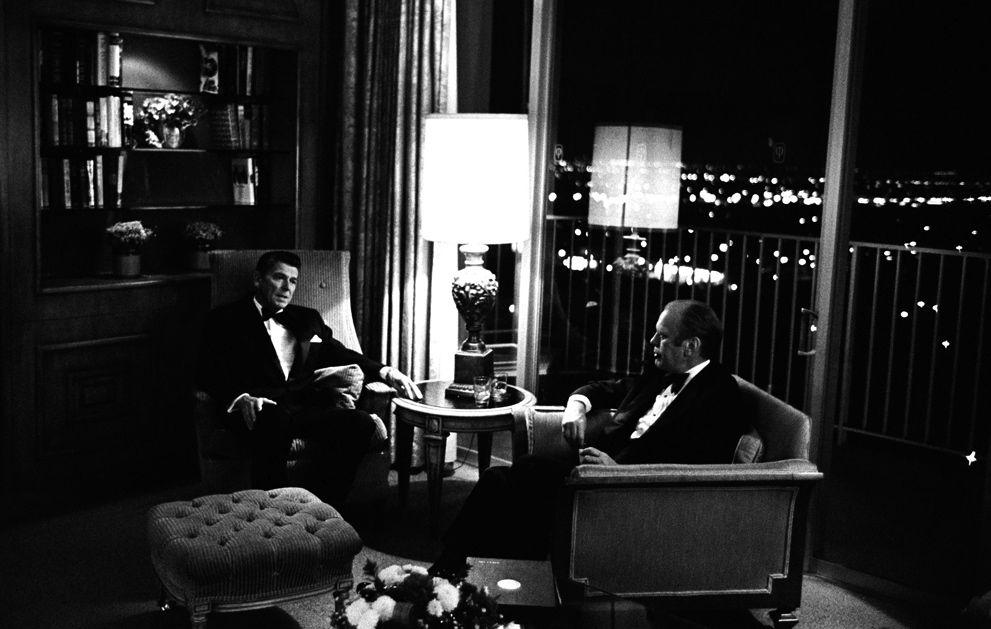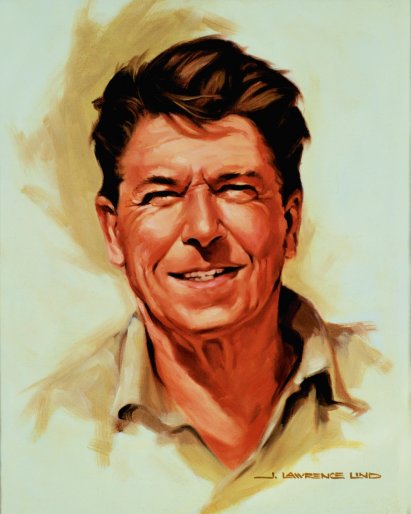Historian Michael Beschloss Tweeted out a wonderful photo:

October 31, 1974: President Gerald Ford, right, met with former-California Gov. Ronald Reagan, at the Century Plaza Hotel, Los Angeles. Photo courtesy Micheal Beschloss.
Who took the photo? What was the event? Beschloss asks on Twitter, why two drinks on Ford’s side of the table, and none on Reagan’s?
Looks like it’s a photo by David Hume Kennerly, the White House photographer in the Ford administration. The photograph was taken with film, probably in black and white to save money and because it was the best way to get images for print media at the time. Few newspapers ran color photos as a regular feature. Electronic still photography at the time occurred in laboratories as tests. As a pragmatic matter, media to store such photographs electronically were impractical — a large mainframe computer might have 256 kilobytes of memory for such storage, or enough for photo of poor resolution.
Kennerly’s site said this meeting came around a black-tie Republican fund-raiser in Los Angeles, at the then-swanky Century Plaza Hotel.
Vanity Fair’s David Friend called it “L.A. Noir” in a 2007 article on a book of photos by Kennerly:
Today, the image conveys a touch of Rat Pack swagger, an architectural elegance, and a hint of the California glamour that Reagan would eventually import to Washington. At the time, however, Kennerly, who had won a Pulitzer for his work in Vietnam, considered the picture too dark and brooding; he almost overlooked the frame on his contact sheet. But that darkness captured something of the spirit of the time: less than three months before, Watergate had forced Richard Nixon from office; inflation, unemployment, and gas prices were on the rise; and the U.S. was facing defeat in Vietnam.
The picture also caught the sometimes frosty relationship between the two leaders. Both Reagan and Ford, after all, would nix the 1980 “dream ticket” idea, floated by some Republican mandarins, to draft Ford as Reagan’s vice president. And Ford, during his unsuccessful 1976 campaign against Jimmy Carter, resented Reagan’s political infighting. “Truthfully,” Ford confessed to Kennerly years later, “I was upset when he challenged me [for the ’76 Republican nomination]. I thought it was unwise for a Republican to challenge a sitting Republican president. We had a pretty bitter contest. It was a head-to-head, knock-down, drag-out affair.”
“I study this picture now,” says Kennerly, “and it looks like a scene from The Godfather”—which had won the best-picture Oscar the year before.
Were I to guess, with a bit of education, I’d say both glasses belonged to Ford, one a cocktail, one water. Reagan tended to avoid alcohol.
A great photograph, a tribute to the artistry and craftsmanship of Kennerly, especially with film; it also poses as a time capsule, freezing convention in GOP big-money fundraising, dress for men of influence and means, architecture, and so much more.

Pulitzer Prize-winning war photographer, and White House photographer, David Hume Kennerly; TEDxBend image
Not before the deluge, not after it, but during the storm. Nixon was three-months gone from the White House. Vietnam’s peace agreement was a year-old, but it was seven months to the final invasion of South Vietnam by the communist North that would force the U.S. retreat, and “reunify” Vietnam under communist rule. The Cold War still raged. Iran was considered a U.S. puppet. Mao Zedong still ruled in China. Elvis Presley still ruled in Memphis. AIDS was unknown. Computers were accounting machines taking floors of entire buildings. Portable telephones were expensive devices that hogged power and generally required at least an automobile to be attached to power the thing.
Barack Obama was 13.
It was a different time.
More:
Spread the word; friends don't allow friends to repeat history.




 Posted by Ed Darrell
Posted by Ed Darrell 







